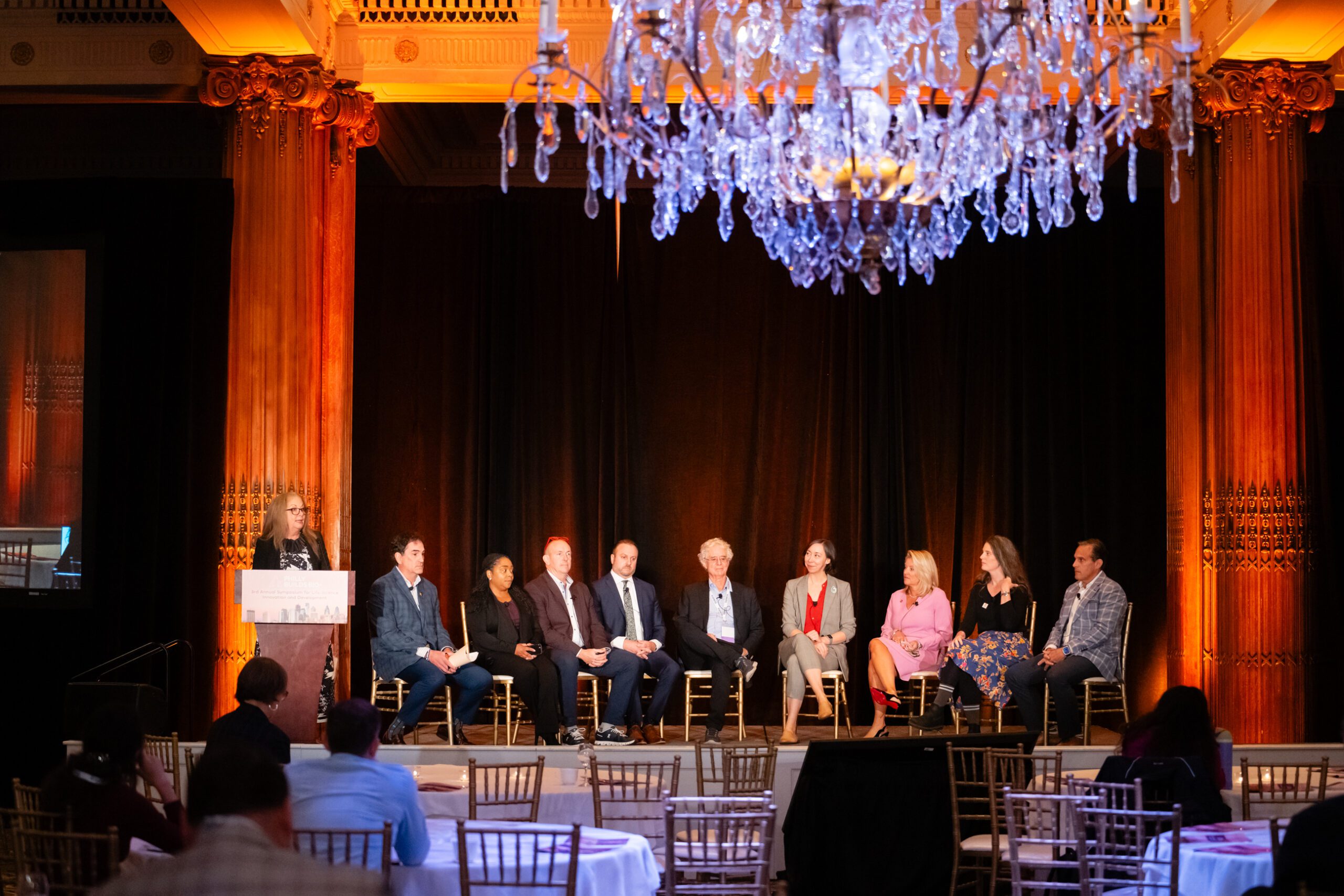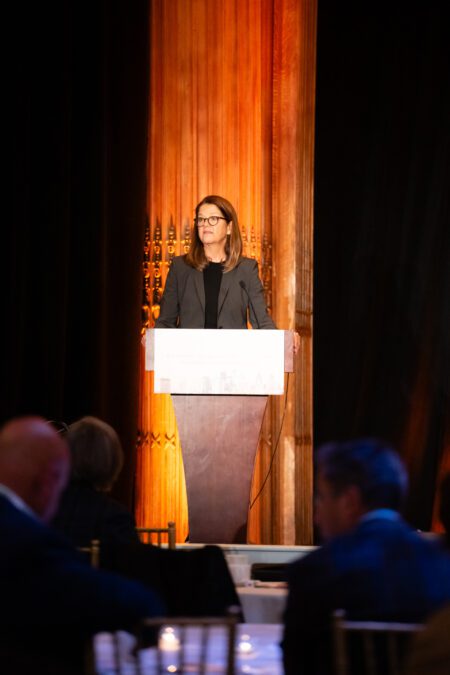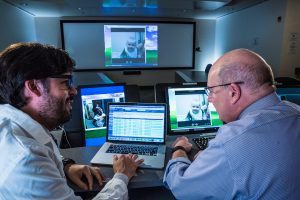
Philadelphia’s Biotech Landscape Thrives: Highlights from the Philly Builds Bio+ Symposium
Philadelphia’s biotech sector is rapidly advancing, marked by significant research milestones and strategic collaborations, as highlighted at the Philly Builds Bio+ Symposium. With robust support from academic institutions and increased NIH funding, the region continues to set the pace for innovation and commercialization in life sciences.
By Bryan Kennedy | October 7, 2024
| BioBuzz has been connecting the life science workforce since 2009. We’ve built an expansive community in the Mid-Atlantic with a national readership that spans from Massachusettes to Florida, and New York to California. For our next chapter, we’re building a proprietary talent logistics model to help employers source and hire life science talent. Learn more. |
Philadelphia has firmly established itself as a leading biotech hub, earning global recognition for its dynamic life sciences ecosystem and innovative breakthroughs. The Philly Builds Bio+ 3rd Annual “Bridging the Gap to Commercialization” Symposium, held on October 1, 2024, underscored the region’s growing impact in the biotech sector, bringing together leaders from startups, investors, researchers, incubators, real estate, and government to discuss the region’s pivotal role in the industry.
Rebecca Grant, Senior Director of Life Science Innovation for the City of Philadelphia, unveiled an in-depth outlook for the region’s life sciences sector in 2024, developed in collaboration with ESI Econsult Solutions. The report highlighted Philadelphia’s emergence as an innovation-driven hub, marked by impressive milestones, including 48 initial public offerings (IPOs) since 2019 and a robust trend in research and development. The region’s biotech sector thrives on accessibility and partnerships, fostering an environment ripe for cutting-edge research. Currently, over 13,000 life science professionals work in Philadelphia, with a broader regional workforce of 88,000, supported by an annual influx of 2,200 life science graduates from 34 colleges and universities. Additionally, the region attracted $5.9 billion in National Institutes of Health (NIH) funding between 2019 and 2023, significantly bolstering its research capabilities.
“Philadelphia is not just following trends; we are setting the pace for innovation,” Grant stated during her keynote address, emphasizing the region’s unique combination of academic excellence, collaboration, and strategic investments in life sciences as vital components driving unprecedented progress.
Philadelphia’s growth is bolstered by its strategic location, with 40% of the U.S. population within a day’s drive. The region ranks 4th in the country for life sciences and 5th for cost of living among major biotech hubs. As the industry expands, it becomes a cornerstone of the city’s economic growth. With a strong research foundation and a commitment to innovation, Philadelphia is poised for sustained success in 2024 and the future.
Philadelphia: At the Forefront of the Advanced Therapies Revolution
During the symposium, discussions emphasized Philadelphia’s emergence as a leader in advanced therapies, fueled by cutting-edge research from institutions like the University of Pennsylvania, CHOP, Wistar Institute, and others. The region is gaining global recognition for its contributions to cell and gene therapy, having developed landmark treatments like Kymriah™ the first approved cell therapy, and LUXTURNA™ the first approved gene therapy.
According to a recent report, Leading the Way: Cell and Gene Therapy in Greater Philadelphia, commissioned by the Chamber of Commerce nearly 10% of the world’s cell and gene therapy companies are based in Philadelphia, employing around 7,000 people, the area is well-positioned to advance healthcare innovations. Additionally, the groundbreaking work of Katalin Karikó and Drew Weissman at Penn Medicine has revolutionized mRNA technology, paving the way for new therapeutic applications.
The progress in cell and gene therapies, along with mRNA technology, is turning innovative treatments into actual cures, offering significant potential to further elevate Philadelphia’s ecosystem. Matt Gardner, Managing Director of CBRE, pointed out that years of investment from institutions like Penn, CHOP, and Wistar—particularly in attracting top scientists like Dr. June, Dr. Levine, Dr. Wilson, and Dr. High during a period of minimal interest in cell and gene therapy—have positioned the region to leverage the advancements of this new era in medicine. He compared the early stages of this sector to the antibody evolution over the last three decades, suggesting we are only scratching the surface of these transformative advancements. This growth will strengthen the biotech ecosystem in the region, promoting collaboration and innovation that can save lives and enhance health outcomes.



(SOURCE: BioBuzz)
The symposium highlighted the translational advancements emerging from the region’s academic institutions, now evolving into standalone companies. Among the presentations were two recently funded firms: Imvax and Latus Bio.
Josh Muntner, Chief Financial Officer of Imvax, discussed groundbreaking advancements in gene therapy that are set to transform cancer treatment. Led by Chief Executive Officer John Furey, the former Chief Operating Officer of Spark Therapeutics, Imvax is developing innovative technology licensed from Thomas Jefferson University. Muntner showcased Imvax’s IGV-001, a personalized immunotherapy that leverages patients’ tumor cells to provoke robust immune responses against glioblastoma. He emphasized the FDA’s Fast Track designation for IGV-001, highlighting the urgent need for effective gene therapies in oncology, and announced a successful $35 million financing round to further advance these solutions.
Jang-Ho Cha, Chief Scientific Officer of Latus Bio, also took the stage to present on behalf of Latus Bio. Co-founded by Professor Beverly Davidson from CHOP, a leading figure in gene therapy research, Latus Bio has raised $54 million in Series A financing, co-led by 8VC and DCVC Bio. This funding will accelerate the development of innovative gene therapy candidates for CLN2 disease and Huntington’s disease, with plans for first-in-human dosing set for late 2025.
The State of the Ecosystem
The theme of “Dark Days” was a central topic in discussions about the global biotech economy, especially as Philadelphia’s biotech ecosystem grapples with a nationwide funding drought. This scarcity makes it increasingly challenging for startups to obtain essential financial resources for research and development. Ian Anderson, Senior Director of Research and Analysis at CBRE, highlighted at the symposium that the funding levels of 2021 were outliers due to excessive investment. He noted that the trends in 2022 and 2023 align more closely with the annual growth patterns seen between 2017 and 2020, but there remains a sense of optimism for the sector.
Despite current challenges, the Philadelphia biotech community shows resilience by leveraging its strong academic institutions and networks. The region is prioritizing strategic partnerships and local support, positioning itself for a rebound in healthcare and biotechnology. Notably, increased NIH funding offers renewed hope for early pre-seed and seed-stage companies.
NIH funding is crucial for small to mid-sized firms, the backbone of Philadelphia’s biotech sector. The introduction of Innovation Hall at this year’s symposium highlighted the importance of regional incubators like CIC, BioLabs, B+Labs, and Pennovation in supporting small and mid-size organizations. These facilities help firms navigate the critical “valley of death” by providing essential resources and mentorship.
These incubators foster collaboration and knowledge sharing, enhancing the success of emerging companies. While the region’s incubators are near capacity, substantial new lab and sublease space is still available, a trend expected to continue through 2025. Developers are optimistic about improving conditions in the coming year, with Matt Gardner of CBRE noting significant progress since 2018/2019 and Philadelphia’s strong performance compared to leading biotech hubs.
The Future of the Ecosystem?
As Philadelphia’s life sciences sector continues to evolve, the outlook remains promising despite current financial challenges. A key discussion at the Symposium, led by Sharon Willis, VP of Sales and Customer Relations at Integral Molecular, highlighted the urgent need for developing human capital programs and fostering a technically skilled and diverse workforce. The panel, which included representatives from regional skills initiatives and higher education, stressed the importance of engaging all levels of labor to create a comprehensive talent pool that reflects the diversity of Philadelphia. They expressed a hopeful vision for building the workforce of tomorrow, emphasizing the need not only to nurture local talent but also to retain it, ensuring the region maintains its competitive edge. Establishing a robust talent pipeline is vital for driving long-term economic growth and encouraging innovation.
This vision for an equitable future aligns with the Pennsylvania administration’s ambitious goals for investment and growth within the industry. In her keynote address, Jennifer Gilburg Deputy Secretary of Technology and Entrepreneurship reaffirmed the state’s commitment to economic development, job creation at all levels, and innovation in the life sciences sector. The administration aims to build strong connections between businesses, the workforce, and Pennsylvania’s leading universities and research institutions to accelerate investment in this critical area.
The symposium highlighted strategies from leading ecosystems to enhance research and development (R&D) and workforce initiatives. Key proposals included increasing state funding for R&D, offering incentives for biotech startups, and enhancing training programs. Panelists advocated for a more integrated ecosystem, akin to MassBio, to effectively tackle industry challenges.
Collaboration among Philadelphia’s life sciences stakeholders is crucial as the sector navigates funding challenges. By prioritizing workforce development and strategic investments, the region aims to strengthen its position in the biotech industry. With strong state support, Philadelphia’s biotech ecosystem is poised for growth, benefiting both the local economy and public health.







